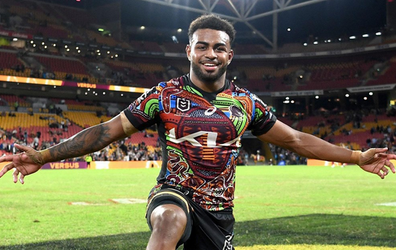- Mar 4, 2008
- 34,780
- 41,482
A report in the SMH saying that there is talk within the NRL to expand to 18 teams and create a conference system.
they'd expand to 18 be still neglecting Perth ... they'll add a second NZ team instead.
the NRL think is will increase revenue .. and well, it works in America, so why wouldn't it work here.
Sydney conference: Roosters, Rabbitohs, Eels, Bulldogs, Tigers, Panthers, Dragons, Sharks, Sea Eagles (play each other twice).
Outer-Sydney conference: Broncos, Titans, Cowboys, Storm, Warriors, Knights, Raiders, new Brisbane franchise, second New Zealand team (play each other twice).
Remaining games: Play opposite conference teams once.
Finals system: Top four teams from each conference play in separate finals series. Winners of each conference square off in grand final for premiership.
Wayne Bennett Says:
“It’s a great sale point,” Bennett told the Herald on Thursday. “America does it in the Super Bowl. The biggest drawing final games we’ve had are when there are two Sydney teams. I went through it with the Dragons when we played the Tigers in the prelim. There was over 60 or 70,000 people there.
“The reality is the biggest crowds at finals times is when local teams play each other. They don’t get crowds when you get Brisbane or Melbourne against a Sydney team. The stupidity of it all is it’s always been about maximising the impact to the game. What they should want is rivalry and having the Tigers playing Parra home and away every year. A conference system guarantees it.”
“I’m a big believer in it,” Bennett told the Herald. “I know it’s a crowd changer. It won’t change the quality of football, though. You’ll get more rivalries and having lived in Brisbane and Sydney I now know the difference. Queensland has Origin as its great rivalry and Sydney has the rivalry between its clubs.
“Even Queensland, they have the Titans, Broncos and Cowboys. That’ll always bet there. Adding a fourth team in Queensland will only add to it as well. You still get to play other teams in the conference once, you just guarantee home and away in your conference – that’s what you get.”
“[Sydney fans] embrace the national league but they also embrace the club rivalry and unless you’re living in Sydney you don’t realise how strong it is. It’s what people outside of Sydney don’t get about Sydney is the genuine rivalry between the clubs here. It makes the game, I love it.”
Andrew Abdo wouldn't comment when contacted by the SMH, said that discussions with the clubs were "confidential" but told NRL. com in a recent interview:
“Moving to 17 teams wouldn’t be an end point. It gets you closer to 18 teams and obviously 18 teams gives you a few different options,” Abdo said.
“An 18th team allows you to think about what we might want to do about expanding in New Zealand. Having two teams in New Zealand creates a tribalism and a new rivalry in New Zealand. It also gives you options around pools because you can have two pools of nine teams. As you see with some of the big US sports, as you grow your competition and the scale of the number of teams, you can create a dynamic around who plays who.
“Ultimately it creates more rivalries in regional areas and have competitions within competitions. You have to begin with the end in mind, you have to always keep an eye on the long term and you have to think about what is moving you closer to becoming an even more sustainable and relevant and viable sport.”
they'd expand to 18 be still neglecting Perth ... they'll add a second NZ team instead.
the NRL think is will increase revenue .. and well, it works in America, so why wouldn't it work here.
Sydney conference: Roosters, Rabbitohs, Eels, Bulldogs, Tigers, Panthers, Dragons, Sharks, Sea Eagles (play each other twice).
Outer-Sydney conference: Broncos, Titans, Cowboys, Storm, Warriors, Knights, Raiders, new Brisbane franchise, second New Zealand team (play each other twice).
Remaining games: Play opposite conference teams once.
Finals system: Top four teams from each conference play in separate finals series. Winners of each conference square off in grand final for premiership.
Wayne Bennett Says:
“It’s a great sale point,” Bennett told the Herald on Thursday. “America does it in the Super Bowl. The biggest drawing final games we’ve had are when there are two Sydney teams. I went through it with the Dragons when we played the Tigers in the prelim. There was over 60 or 70,000 people there.
“The reality is the biggest crowds at finals times is when local teams play each other. They don’t get crowds when you get Brisbane or Melbourne against a Sydney team. The stupidity of it all is it’s always been about maximising the impact to the game. What they should want is rivalry and having the Tigers playing Parra home and away every year. A conference system guarantees it.”
“I’m a big believer in it,” Bennett told the Herald. “I know it’s a crowd changer. It won’t change the quality of football, though. You’ll get more rivalries and having lived in Brisbane and Sydney I now know the difference. Queensland has Origin as its great rivalry and Sydney has the rivalry between its clubs.
“Even Queensland, they have the Titans, Broncos and Cowboys. That’ll always bet there. Adding a fourth team in Queensland will only add to it as well. You still get to play other teams in the conference once, you just guarantee home and away in your conference – that’s what you get.”
“[Sydney fans] embrace the national league but they also embrace the club rivalry and unless you’re living in Sydney you don’t realise how strong it is. It’s what people outside of Sydney don’t get about Sydney is the genuine rivalry between the clubs here. It makes the game, I love it.”
Andrew Abdo wouldn't comment when contacted by the SMH, said that discussions with the clubs were "confidential" but told NRL. com in a recent interview:
“Moving to 17 teams wouldn’t be an end point. It gets you closer to 18 teams and obviously 18 teams gives you a few different options,” Abdo said.
“An 18th team allows you to think about what we might want to do about expanding in New Zealand. Having two teams in New Zealand creates a tribalism and a new rivalry in New Zealand. It also gives you options around pools because you can have two pools of nine teams. As you see with some of the big US sports, as you grow your competition and the scale of the number of teams, you can create a dynamic around who plays who.
“Ultimately it creates more rivalries in regional areas and have competitions within competitions. You have to begin with the end in mind, you have to always keep an eye on the long term and you have to think about what is moving you closer to becoming an even more sustainable and relevant and viable sport.”






